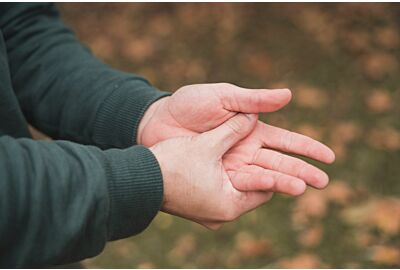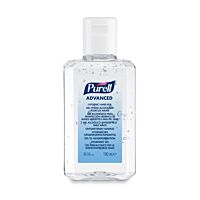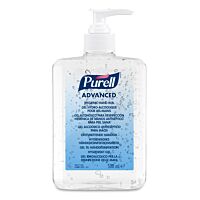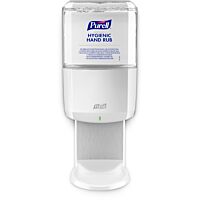Your hands are valuable tools. Like any instrument, they need to be maintained and cared for to function properly, especially now in winter. Since the pandemic, everyone has started to clean their hands more thoroughly - and that's a good thing. But because of the extra cleaning, some people suffer from dry, cracked hands and blame it on their hand sanitiser. However, there are many causes and solutions for dry hands.
Sufficient moisture
Dry hands, feelings of tension, cracked or chapped hands are annoying complaints that affect the outermost layer of our skin, the stratum corneum, which fends off germs and provides the skin with moisture. The skin on the hands is an excellent protective barrier that serves as the first line of defence against infection-causing germs. Since dehydrated skin can lead to cracks in this armour, keeping your hands well moisturised is important act of care to maintain skin function. Especially in winter when central heating and cold temperatures dry out our skin even more.
Hand care - a winter and summer routine
Typically, when we think of dry hands, we immediately associate the winter months with chapped and painful skin. And yes, in the colder months, the moisture in the air is reduced so our hands need special attention to restore their own moisture and maintain the health of the skin. However, this is not just the case in winter. In summer, sun exposure, air conditioning and chlorine from the swimming pool can dry out hands just as much1. It is therefore important to use a moisturiser even when the air is humid.
7 valuable tips for skin health
With these tips we can restore the health of our skin:
- Use cool water to rinse off. Using hot water when washing hands can strip hands of their natural lipids and contribute to dryness.
- Rinse hands thoroughly after washing. Leaving soap on the skin can cause irritation, which in turn contributes to irritated and cracked skin.
- Be gentle with your skin. Dry your hands thoroughly but pat them dry instead of pulling the towel roughly over the skin, which can cause additional skin irritation that can be avoided with a gentler drying method.
- Moisturise your hands after washing them. The ideal time to apply a moisturiser is just after washing your hands to lock in some of the moisture. It is okay to moisturise after disinfecting; just make sure your hands are completely dry before applying the lotion.
- Use a well-formulated lotion. Oil-based lotions and creams can hydrate your hands, increase the moisture content of the skin and restore the lipid content of the skin surface, which contributes to the barrier function of normal skin2. Choose moisturisers from brands you trust and use them frequently, especially when skin feels dry and tight.
- Use gloves when washing dishes or working outside in cold temperatures. Gloves provide a physical barrier that protects your hands from dishwashing liquid (which is not suitable for hands) and the winter elements.
- Do not use harsh soaps or low-quality hand sanitisers. Hand washing or sanitising with quality products will not harm your skin. Use gentle cleansing soaps with moisturising additives and quality alcohol-based hand sanitisers with moisturising additives and skin conditioners, such as PURELL® Advanced Hygienic Hand Rub. Your skin should feel smooth and soft after washing. If it feels dry or tight, you may need to use a different soap.
Simplest measures
Healthy hands start with clean hands. Washing your hands with soap and water and using a good quality hand sanitiser are among the simplest measures to reduce germs that can make you sick.
PURELL® hand sanitisers are formulated to be effective against germs in the most demanding situations and contain moisturisers and skin conditioners to keep hands feeling soft even during intensive use.
1 Retrieved on June 3, 2021. Dermatology & Mohs, “How to Avoid Dryness in Summer Months.” https://www.dermatologymohsinstitute.com/blog/how-to-avoid-dryness-in-summer-months
2 Wilhelm KP. Prevention of surfactant-induced irritant contact dermatitis. Curr Probl Dermatol 1996;25:78—85




